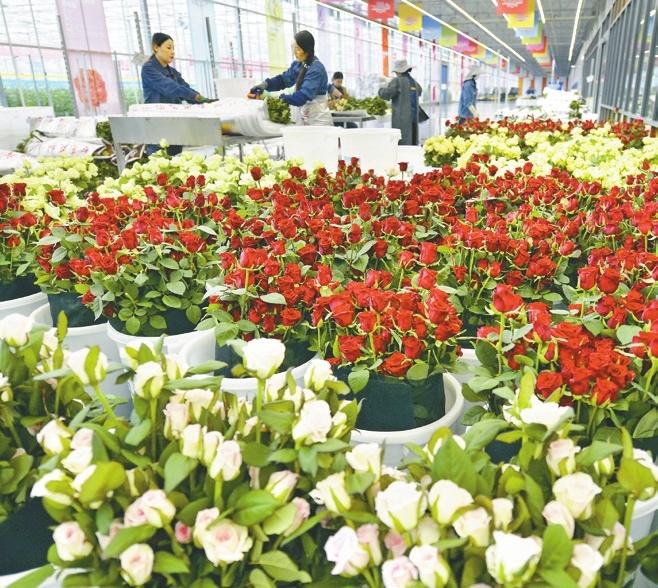
AMIDST the crisp autumn breeze, a multitude of roses is blossoming in an automated smart greenhouse situated in Fuhan Township, Gansu Province in Northwest China. Operated by Linxia Yinong Agriculture and Animal Husbandry Investment Co., Ltd., this greenhouse is part of the Flower Port project, encompassing three facilities spanning a combined area of approximately 200,000 square meters in the Linxia Hui Autonomous Prefecture. Since its inception in October of last year, the project has successfully nurtured around 1.5 million rose seedlings. Employing cutting-edge agricultural technologies like an automated temperature and humidity control system, as well as an integrated smart irrigation and fertilization system, this facility has earned the moniker “rose gigafactory” from the local community. It boasts a daily output of approximately 200,000 freshly-cut roses. Located at an average elevation of 2,000 meters, with ample sunlight and a dry climate, the prefecture offers ideal conditions for rose cultivation. Fuhan Township, home to approximately 40,000 residents, has witnessed many local farmers transition into industrial workers thanks to the flourishing rose industry. The Flower Port project has created over 500 employment opportunities for the local population. The daily task fo Xu Shuqin, one of the workers, is carefully arranging thornless roses in paper boxes. “Recently, rose orders have surged, and I find myself packaging over 4,000 fresh flowers per day,” shared the 32-year-old, who often dons headphones to enjoy popular music during her work shifts. Xu is content with her position at the company, given that the average annual salary for workers there reaches 45,000 yuan (US$6,276), a significant improvement compared to traditional farming incomes. Recently, Xu and her colleagues meticulously packaged a shipment of fresh-cut roses bound for Moscow, to be sold in local flower markets. Having been involved in the flower trade for over a decade, Russian businessman Ageev Rinad has visited the Flower Port facility thrice. In mid-October of this year, his company placed an order for 200,000 fresh-cut roses, which were shipped from Linxia. The flowers were transported via a cold-chain truck, traversing the Alataw Pass in the northwestern Xinjiang Uygur Autonomous Region, passing through Kazakhstan, and ultimately reaching their destination in Moscow. “This was our first experience using land transportation to bring fresh-cut roses from Linxia to a city in Russia,” Rinad said. “The customs and trade departments in Gansu worked tirelessly to assist us in the customs clearance process. I truly appreciated their efforts.” This August, the Chinese company successfully exported some of its flowers to Kazakhstan for the first time. Two other flower companies in the prefecture have exported their products to Japan, the Republic of Korea, and Singapore, as international demand is on the rise for Linxia’s delightful blooms. (Xinhua) | 
